At 26 years old, Gretė Lukošaitytė is currently pursuing a Master’s degree in Aviation Management at Kazimieras Simonavičius University (KSU) while also serving in the Lithuanian Air Force. From the very first moments of our conversation, it is clear that she is determined, disciplined, and unwavering in her pursuit of success. Her responses are precise, she radiates optimism, and she instantly generates ideas—particularly on how to introduce young members of the Lithuanian Armed Forces to the opportunities of remote learning, which she finds highly attractive. There is no doubt—Gretė is a leader. 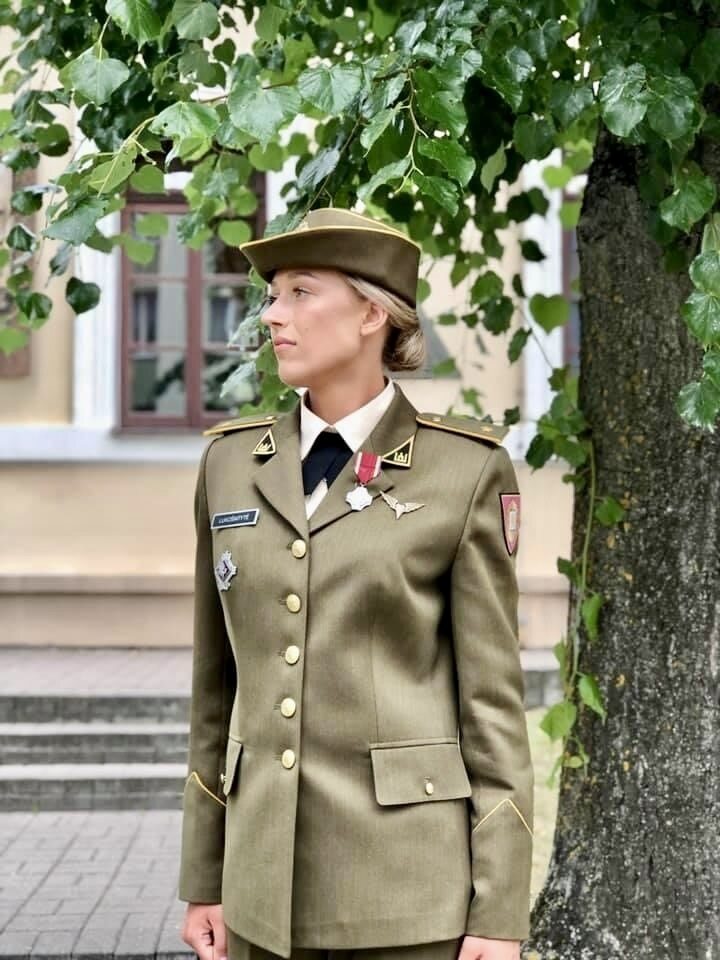
The Source of Willpower and Determination
When asked where her strong will and perseverance come from, Gretė credits her education at the Lithuanian Military Academy for instilling discipline and resilience, while the unwavering support of her family gave her confidence.
“The environment we grow up in plays a crucial role in shaping the individuals we become,” she reflects.
A Career in Aviation and the Pursuit of Passion
During her school years, Gretė attended Lizdeika Gymnasium in Radviliškis, where she actively participated in athletics, specialising in high jump. She was even selected for the Lithuanian national team. From an early age, she was fascinated by Lithuanian history, took part in patriotic events, and, at just 13 years old, joined the Lithuanian Riflemen’s Union. Later, she enrolled at the General Jonas Žemaitis Military Academy of Lithuania, where she studied International Relations.
After completing her military academy studies, Gretė decided to immerse herself in aviation. She is now pursuing a Master’s degree in Aviation Management at KSU, one of the few universities in Lithuania offering this specialisation. The option to study remotely was a key factor in her decision.
“Aviation is a dynamic, technology-driven field where economics, flight safety, operational planning, business models, international connectivity, and geopolitics all intersect. I love the fact that learning here never stops. Aviation is constantly evolving, and that is precisely what makes it so exciting and motivating,” she explains.
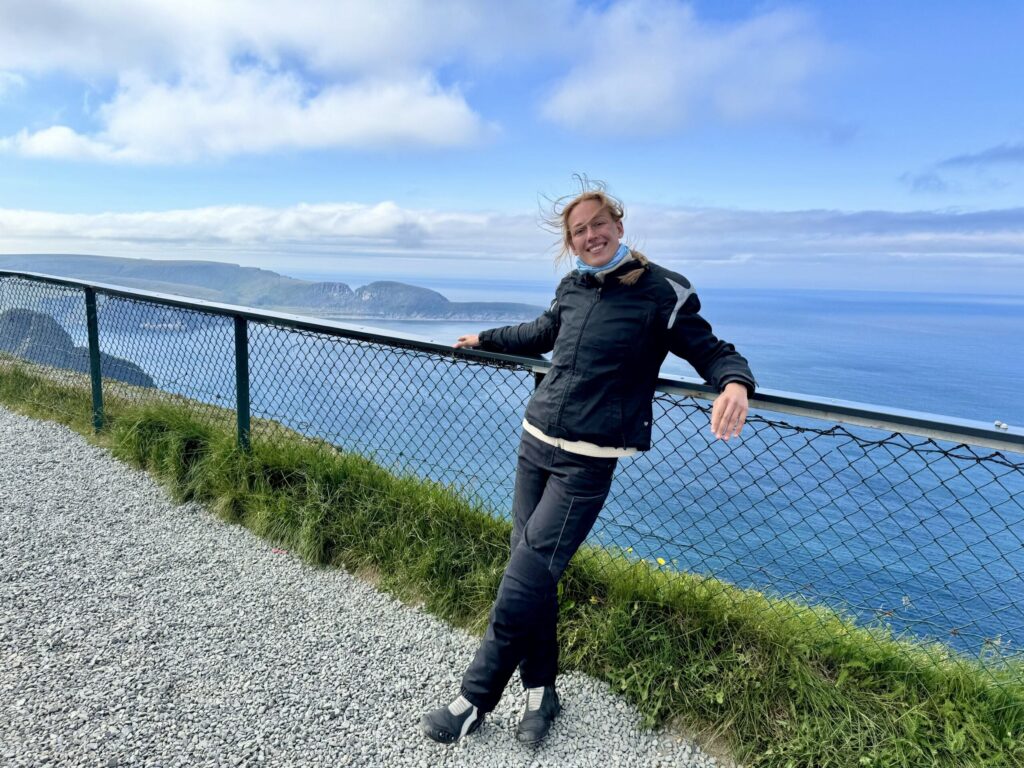 She is particularly interested in the strategic role of aviation in international relations and the global economy.
She is particularly interested in the strategic role of aviation in international relations and the global economy.
“After studying international relations, I realised that aviation is inextricably linked to geopolitics and the interactions between nations,” she affirms.
Remote Studies – A Solution for Busy Professionals
Gretė highlights that remote studies are invaluable for postgraduate students who must juggle their studies with work or other responsibilities.
“For me, it was essential to combine my studies with military service. KSU offers this flexibility—lectures are held in the evenings and delivered remotely. Despite the online format, the quality of education at KSU is exceptionally high—courses are taught in English by experienced aviation professionals from abroad, many of whom have years of industry expertise. This not only provides theoretical knowledge but also exposes students to real-world challenges and trends in the aviation sector,” says Gretė.
“KSU has developed an outstanding remote learning system—all course materials are available on the Moodle platform, lectures take place via MS Teams, and recordings can be accessed at any time. This level of flexibility is invaluable,” she adds.
Despite studying remotely, Gretė actively engages with her classmates and meets them in person for exams and assessments.
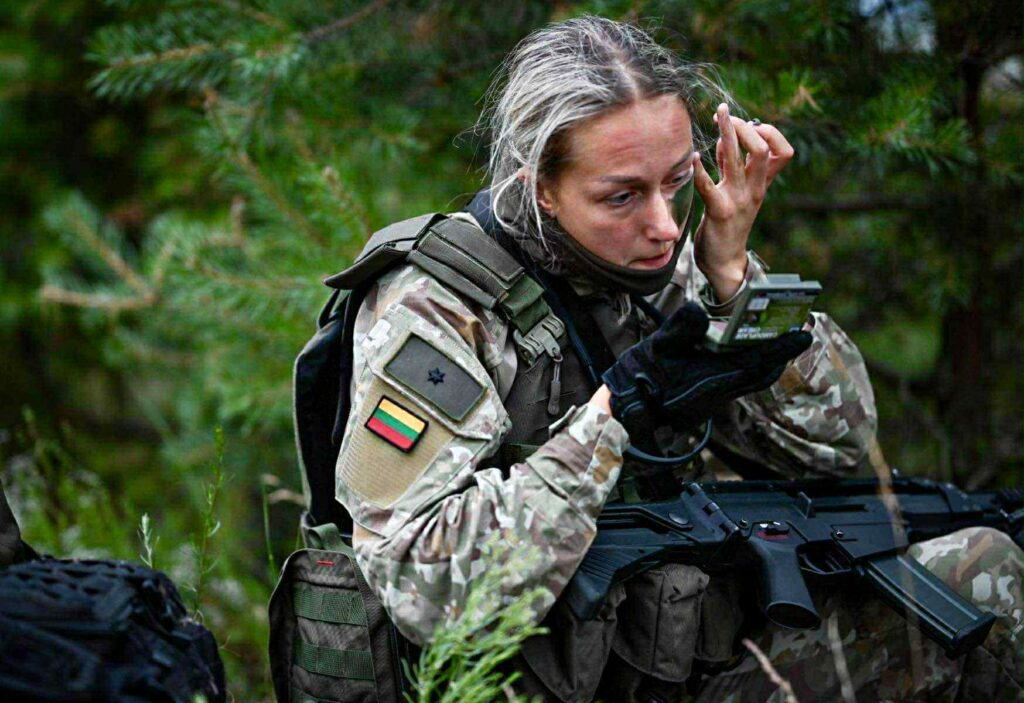 Her favourite study module is “Business Models and Trends in Aviation”, which has provided her with a deep understanding of the aviation industry’s core principles, continuous transformations, and the innovations shaping its future.
Her favourite study module is “Business Models and Trends in Aviation”, which has provided her with a deep understanding of the aviation industry’s core principles, continuous transformations, and the innovations shaping its future.
Leisure and Interests
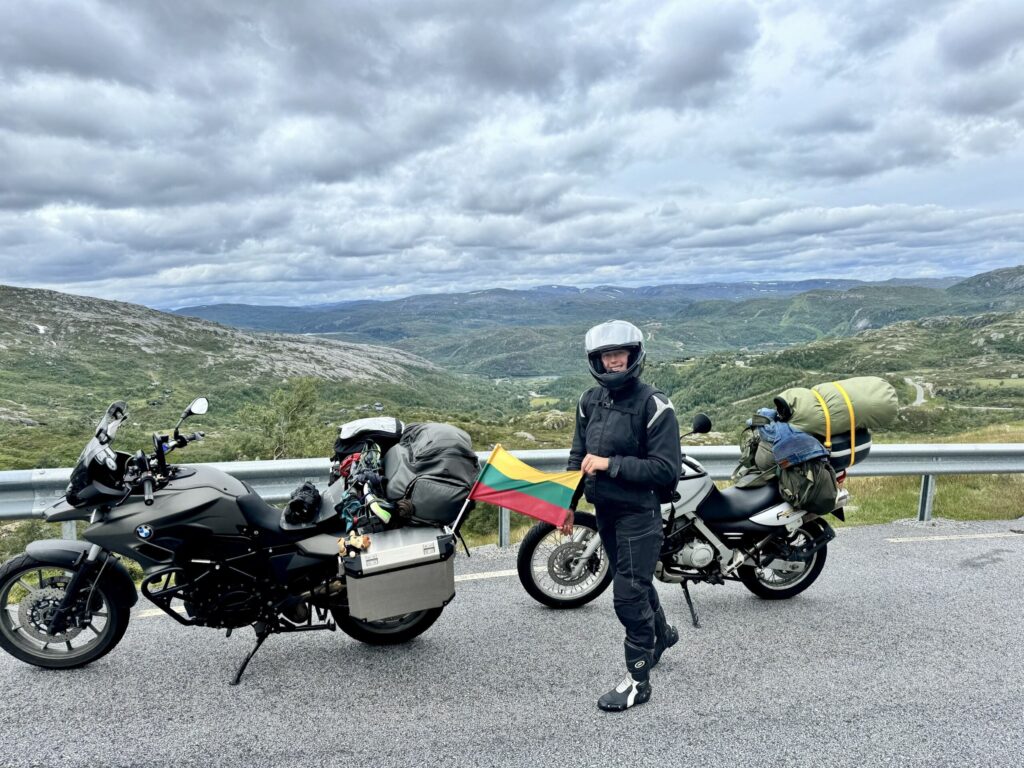 In her free time, Gretė is dedicated to personal development—she is passionate about history, aviation, and geopolitics, as these subjects enable her to gain a deeper understanding of global events and their interconnections.
In her free time, Gretė is dedicated to personal development—she is passionate about history, aviation, and geopolitics, as these subjects enable her to gain a deeper understanding of global events and their interconnections.
She also has a fascination for vintage cars, which she regards as living relics of the past, encapsulating the spirit of their time.
Additionally, she loves to travel, particularly by motorcycle, as it allows her to experience the world from a different perspective. Hiking in nature helps her unwind, while participating in social events fosters a sense of community. She also prioritises self-improvement—reading books and staying active through sports.
Reflections on Her Generation and Its Potential
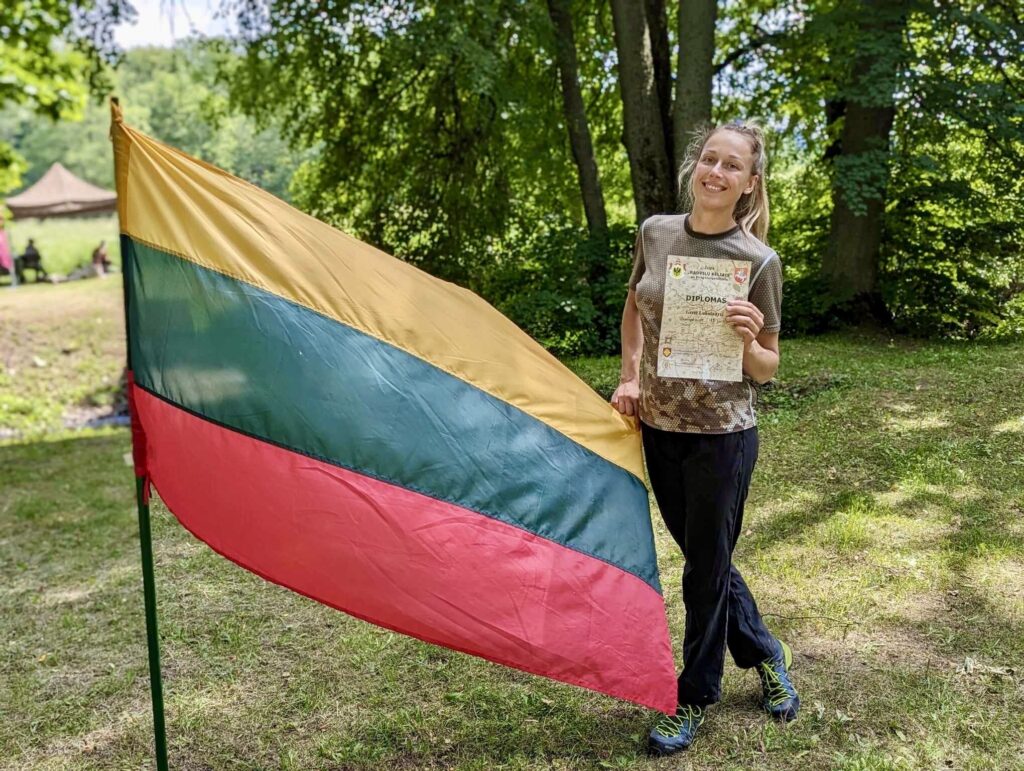 According to Gretė, those born in 1998 are an ambitious and goal-driven generation. Many of her peers have already established their career paths, invest in education and personal growth, and are actively engaged with the world around them. She finds it inspiring to see young people pursuing their chosen paths with confidence.
According to Gretė, those born in 1998 are an ambitious and goal-driven generation. Many of her peers have already established their career paths, invest in education and personal growth, and are actively engaged with the world around them. She finds it inspiring to see young people pursuing their chosen paths with confidence.
“I encourage my peers to be persistent and to trust in their abilities when striving for their goals. Do not be afraid of making mistakes—failures are valuable lessons that shape and strengthen us. There are countless opportunities available to us; we just need to seize them wisely,” she advises.
In life, she follows the words of Jimmy Dean:
“I can’t change the direction of the wind, but I can adjust my sails to always reach my destination.”
From 22 to 25 June 2025, the 25th Annual Conference of the European Academy of Management (EURAM) took place at the Faculty of Economics and Management of the University of Florence, Italy. This prestigious event brings together leading scholars and researchers in the field of management from across Europe.
This year’s conference theme was “Managing with Purpose”. Presentations and discussions focused on topics such as entrepreneurship, family business, inclusion and diversity in organisations, innovation management, international management, organisational behaviour and human resource management, research methods and practice, strategic management, and more.
For the second consecutive year, the Vice-Rector for International Relations and Development at Kazimieras Simonavičius University (KSU), Deimantė Žilinskienė, participated in the EURAM conference as a panellist and speaker in a symposium panel discussion. Her presentation was entitled “Career, Purpose, Fulfilment – Professional Biographies in Management Research and Education.”
Other participants in the panel discussion included Prof Dr Albrecht Fritzsche (IEDC – Bled School of Management, Slovenia), Frederike Scholz (HU University of Applied Sciences, the Netherlands), Joanna Szulc (Gdańsk University of Technology, Poland), and Miguel Pérez Valls (University of Almería, Portugal).
From 16 to 20 June, Kazimieras Simonavičius University (KSU) welcomed international students and lecturers to an Erasmus+ Blended Intensive Programme (BIP) focused on “Artificial Intelligence Risks in Business: Legal, Cultural, and Ethical Aspects.” 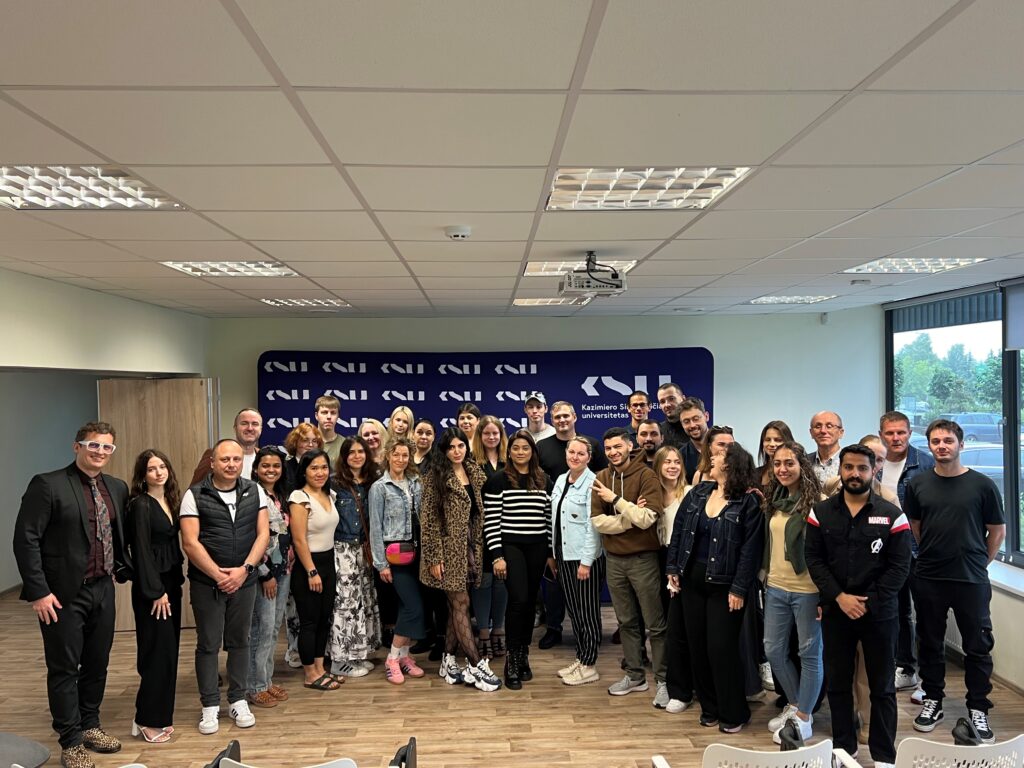
Participants from universities in Poland, Austria, and Latvia gathered in Vilnius for five days of intensive learning, exploring both the opportunities and challenges posed by the application of artificial intelligence in business contexts.
According to Oleg Beriozov, Head of Studies and Research at the KSU Institute of Law and Technology and one of the programme’s organisers, the participants enthusiastically engaged in the academic activities, delving into the impact of AI on business processes, legal frameworks, and consumer behaviour.
“Each day was dedicated to the analysis of practical case studies, interactive discussions, and solution development. The goal was to enhance participants’ ability to critically evaluate AI-related decisions in real-life scenarios. The discussions and reflections once again demonstrated the wide array of challenges and possibilities that AI brings to the modern business environment,” he noted.
The lectures and workshops were delivered by the KSU academic team, led by lecturer Ramūnas Jucevičius, a specialist in AI regulation and risk management.
In addition to the academic programme, participants had the opportunity to explore Vilnius Old Town, which, according to their feedback, left a lasting impression.
Such international initiatives not only strengthen the European higher education community but also promote intercultural dialogue, the exchange of ideas, and the adoption of innovative teaching methods. As many participants shared, they are leaving not only with new knowledge, but also with meaningful experiences and connections that have enriched them as members of the global academic community.
By Dr Helga M. Kauzonė, Vice-Rector for Research, Kazimieras Simonavičius University
Lithuania is increasingly recognising that national progress and global competitiveness depend on our ability to generate, develop, and commercialise scientific knowledge and innovation. Yet, the biggest barrier to meaningful innovation remains the disconnect between science and business. Although innovations are emerging, many stall early due to a lack of mechanisms for successful commercialisation.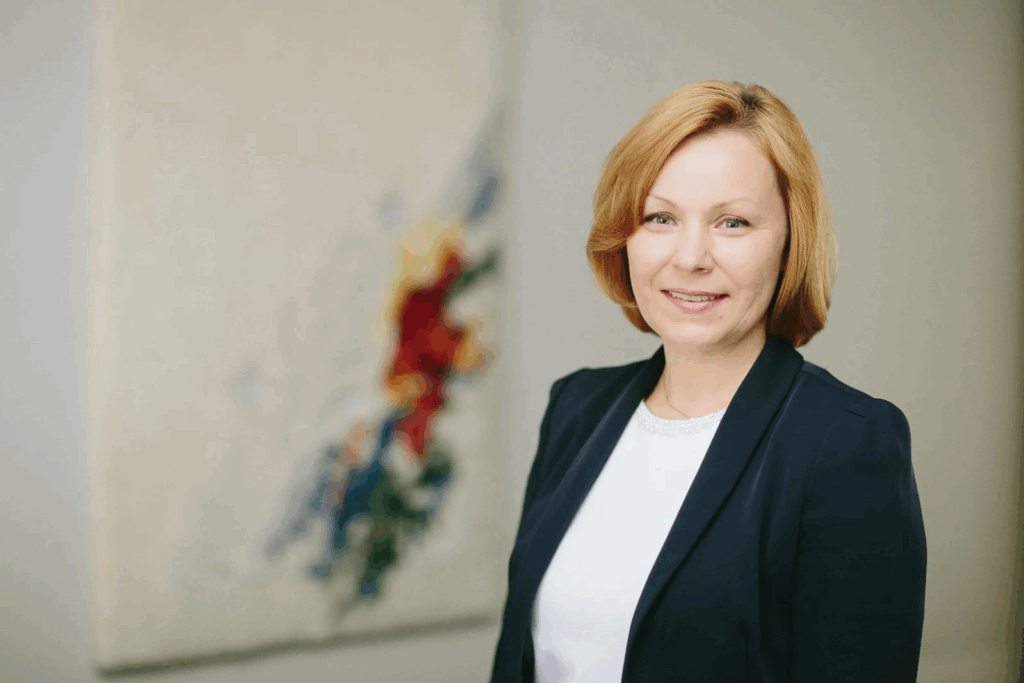
To address this, Kazimieras Simonavičius University (KSU) has launched the Institute for Research and Innovation (IRI) – a central platform linking strategic research, inter-institutional collaboration, and practical solutions for the knowledge economy.
The IRI: Beyond the Traditional University Model
The IRI is not just another academic centre. It is a forward-looking initiative designed to build a responsive, interdisciplinary, and future-oriented research infrastructure. Its mission: to tackle global, national, and sector-specific challenges head-on.
The Institute brings together diverse research clusters – from health and longevity engineering to digital trust, regional resilience, and the space economy. Each cluster unites researchers, lecturers, students, and industry partners to generate both scientific knowledge and real-world value.
KSU’s creation of the IRI marks a shift to a truly integrated knowledge ecosystem.
Progress Is Underway – But Still Falls Short
While there has been tangible progress – with increased investment in R&D and growing strength in sectors like biotechnology and lasers – innovation commercialisation remains sluggish.
Unfortunately, R&D funding from both public and private sectors is still too limited to deliver breakthrough results. Enthusiasm alone won’t suffice; what’s needed is consistent government policy, structural investment, and coordinated leadership.
According to recent data from the Ministry of the Economy and Innovation, Statistics Lithuania, and the EU Innovation Scoreboard:
R&D Must Become a National Priority
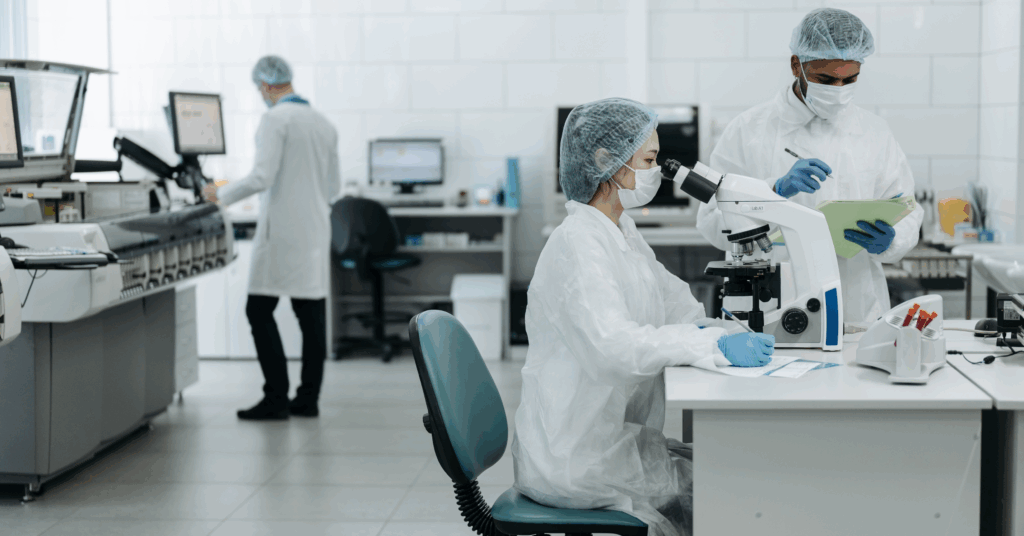 R&D is not just the domain of universities – it is a pillar of national development. In today’s knowledge-driven economy, strengthening R&D must be recognised as a strategic national priority.
R&D is not just the domain of universities – it is a pillar of national development. In today’s knowledge-driven economy, strengthening R&D must be recognised as a strategic national priority.
Initiatives like KSU’s IRI show how universities can act as practical innovation platforms, where research, student engagement, and business partnerships lead to tangible technologies and services.
Unlocking Regional Potential
It is critical that these knowledge ecosystems are not concentrated solely in Vilnius. Lithuania’s regions hold vast untapped potential – often lacking strong research institutions or the means to leverage them effectively.
Regional knowledge centres can serve as local innovation hubs, linking businesses, public institutions, and academic partners. By focusing on local industry profiles, economic activity, and community needs, these centres can drive locally applied innovation that directly benefits surrounding communities.
Four Strategic Pillars for Strengthening R&D in Lithuania
From Theory to Impact: A Call for Collective Action
Science without business remains theory. Business without science risks stagnation. But together, they spark progress.
To bridge the R&D gap, Lithuania needs more than good intentions – it requires a systemic commitment backed by funding, institutions, and political will. Only then can innovation truly take root and flourish.
Kazimieras Simonavičius University (KSU) is making a bold move to enhance its scientific and innovation capabilities with the launch of the Institute for Science and Innovation. This newly established Institute will serve as a strategic hub, bringing together the University’s research efforts while fostering interdisciplinary collaboration, knowledge exchange, and innovation development. 
“Our aim is to make science open, impactful, and valuable for society — to drive innovation and contribute to Lithuania’s progress,” says KSU Rector Assoc. Prof. Dr Gitana Neverienė. She emphasises that innovation is a key driver of societal and national advancement, and achieving this requires close cooperation between academia, business, and the public sector.
Thematic Hubs: Responding to Today’s Challenges
Vice-Rector for Research Dr Helga M. Kauzonė explains that the Institute’s work will revolve around thematic research hubs — dynamic, interdisciplinary communities of researchers, lecturers, students, and external partners focused on the most pressing issues in society, technology, and the economy.
These hubs will operate across three levels:
The Institute will coordinate these activities, ensuring strategic alignment, methodological support, and cross-sectoral synergy.
Bridging the Gap: From Lab to Business and Society
 A key mission of the Institute is to ensure efficient knowledge transfer. According to Dr Kauzonė, KSU’s research hubs will collaborate with businesses on joint projects, tackle technological challenges, involve students in research, and support the commercialisation of scientific results.
A key mission of the Institute is to ensure efficient knowledge transfer. According to Dr Kauzonė, KSU’s research hubs will collaborate with businesses on joint projects, tackle technological challenges, involve students in research, and support the commercialisation of scientific results.
“Science shouldn’t remain confined to labs or academic walls. It must create real value for society and respond to today’s challenges. We place great importance on a two-way dialogue — encouraging businesses and communities to identify problems that can inspire new research directions. This is how we ensure a dynamic, responsive knowledge cycle,” she notes.
A Global Outlook
International cooperation will be a core focus of the Institute. From building partnerships with universities and researchers abroad to participating in consortia and mobility programmes, the Institute will help strengthen KSU’s global presence and contribute to the growth of the international knowledge ecosystem.
The Institute for Science and Innovation will be a vibrant platform where research, education, practice, and innovation converge — driving progress at both national and international levels.
On 12 June, the inaugural meeting of the newly formed Senate of Kazimieras Simonavičius University (KSU) was held, during which the Chair, Deputy Chair, and Secretary of the Senate were elected.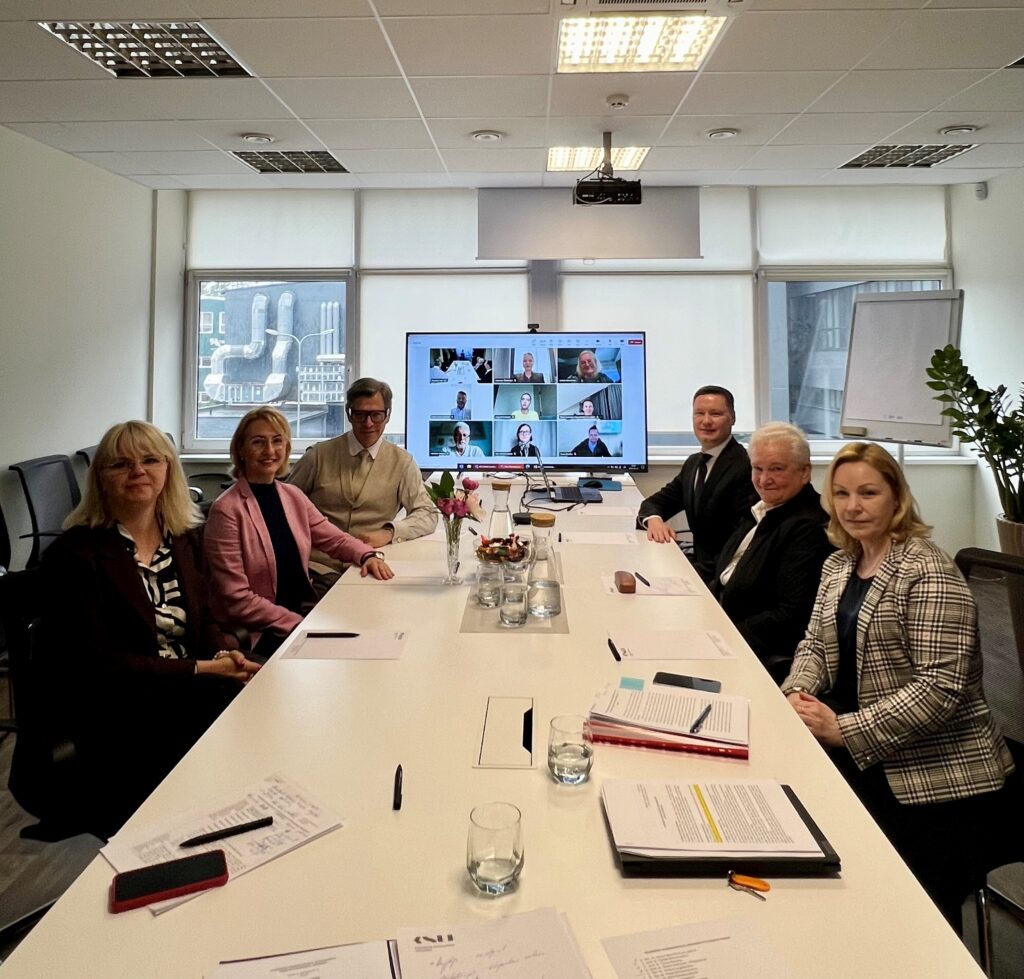
Professor Dr Jolanta E. Zabarskaitė was elected as Chair of the Senate, Professor Dr Rokas Uscila as Deputy Chair, and Deimantė Žilinskienė, KSU Vice-Rector for International Relations and Development as Secretary.
In her remarks, the newly elected Chair, Professor Dr Zabarskaitė, thanked the Senate members for their trust and expressed confidence that “the University’s strong academic community and team are ready to take an ambitious leap forward in pursuit of our set goals.”
The meeting also included discussions and the adoption of key decisions concerning the development of the University’s academic programmes and research activities.
On 4 June, the international exhibition “The Queen, the Kingdom and the Feelings” opened at the House of Histories, part of the National Museum of Lithuania. Kazimieras Simonavičius University (KSU) is proud to be an official partner of this unique cultural project. 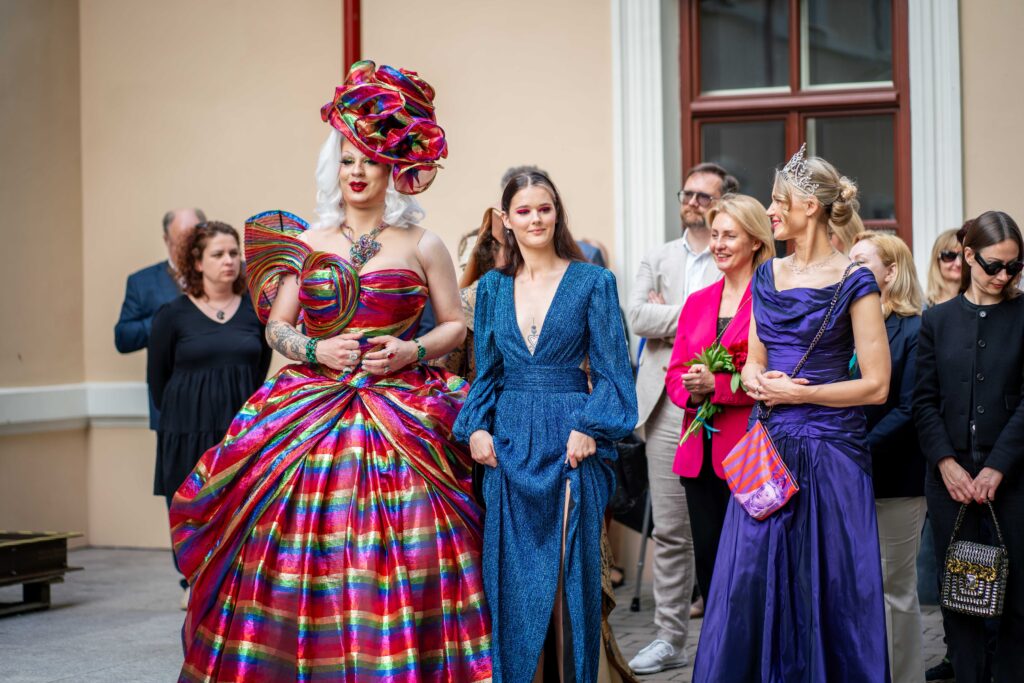
The exhibition highlights the lives of two prominent 16th-century Lithuanian noblewomen – Barbara Radziwiłł (Barbora Radvilaitė), Queen of Poland and Grand Duchess of Lithuania, and Catherine Jagiellon (Kotryna Jogailaitė), Queen of Sweden. For the first time in Lithuania, visitors can see original artefacts from major museum collections in Hungary, Poland, and Sweden, including Renaissance jewellery and symbolic objects of power.
More than a historical display, the exhibition encourages reflection on leadership, identity, and emotion. After its debut in Vilnius, it will travel to Uppsala Castle Art Museum in Sweden.
“By supporting this project, we foster dialogue between science, art, and society while strengthening our cultural heritage,” said Associate Professor Dr Gitana Neverienė, Rector of KSU.
Exhibition concept author and co-curator Julija Janus thanked KSU for its support, emphasizing the importance of the university’s involvement in making the project a reality. “Partnering with a university that shapes future leaders gave us both practical support and symbolic significance,” she said.
As part of its engagement, KSU will host an academic conference, “Between Stigma and Charisma: Continuity of Women’s Leadership in Lithuanian History”, on 6 December 2025 – Barbara Radziwiłł’s (Barboros Radvilaitės) birthday – at the National Museum of Lithuania. Julija Janus will be among the keynote speakers. 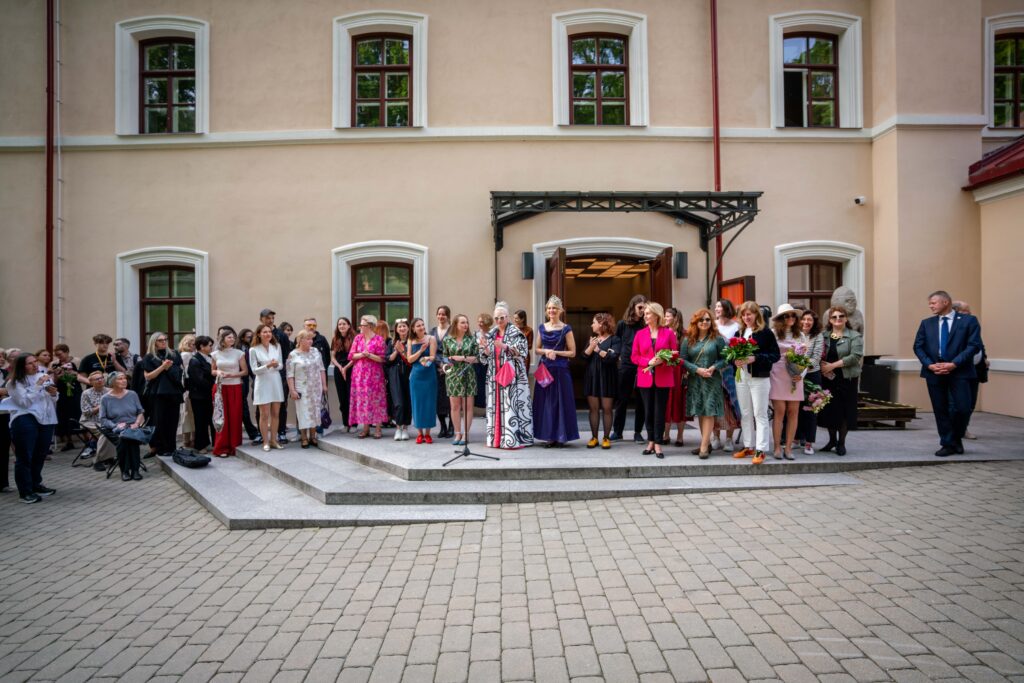
“This conference will examine how female leadership evolved across history and its relevance today,” added Rector Neverienė.
KSU students from the Fashion Industry and Communication programmes will be actively involved in organising the event, gaining valuable experience in cultural project management.
The exhibition runs until 4 January 2026.
Photo credit — Silvestras Samsonas / National Museum of Lithuania.
Kazimieras Simonavičius University (KSU) is more than just a place to acquire knowledge — it is also an incubator for forward-thinking ideas. One of its most dynamic initiatives is the Next Society Institute (NSI), a research institute affiliated with KSU and led by Prof. Dr. Steffen Roth, who playfully calls it a “theory start-up.” A visionary sociologist and management thinker, Prof. Roth is known for revitalising systems theory—especially the work of Niklas Luhmann—for the 21st century. 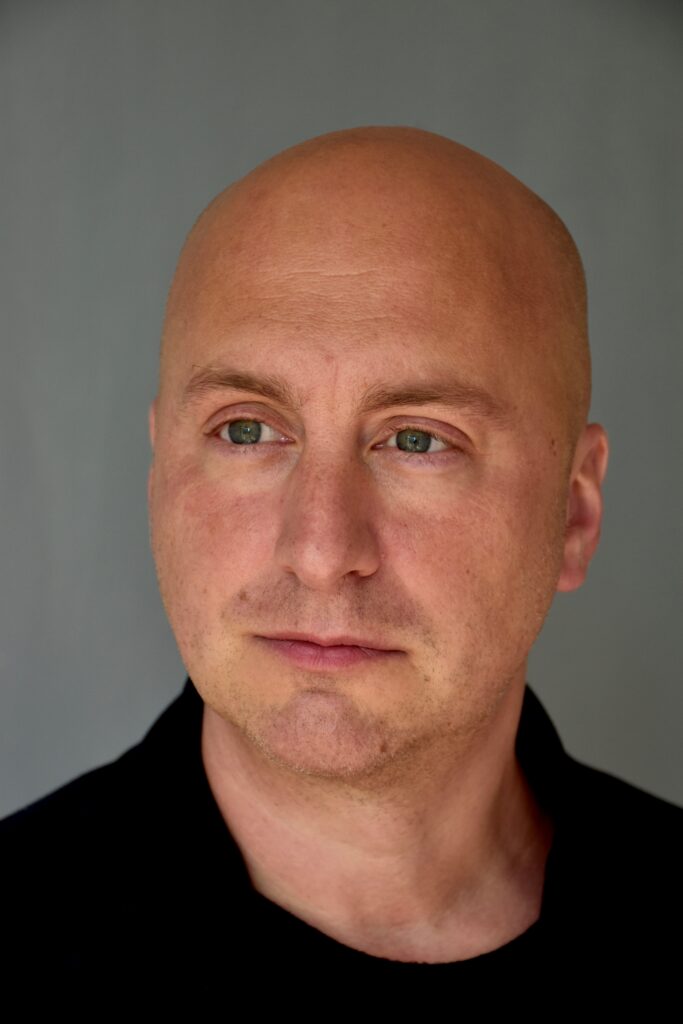
Prof. Roth is a professor at Excelia Business School in France and a visiting fellow at Wolfson College, University of Cambridge. At NSI, he and his team explore what lies beyond today’s mainstream ideas—helping shape the future of theory, innovation, and society.
We met at a lively hotel reception in central Vilnius to discuss about the NSI. The formality quickly gave way to a more relaxed tone as Prof. Roth, smiling, suggested using my phone as a microphone to ensure a clear recording.
What is the role of the NSI?
SR: Our aim is to demonstrate that theory—particularly systems theory in the tradition of Niklas Luhmann—can be both practical and highly valuable. His systems theory may seem counterintuitive at first, but once understood, it offers profound insights—especially in areas like management consulting. Nothing is more practical than a good theory.
Are you updating these theories for modern times?
SR: Absolutely. Systems theory is a 20th-century theory programme, and like any programme, it requires updating. We’re currently adapting it for the 21st century. It’s not just still relevant—it’s often superior to many prevailing theories in the social sciences.
What is at the core of Niklas Luhmann‘s theory?
SR: Niklas Luhmann believed that society is not a large group of individuals, but a complex system of communication. According to his theory of social systems, different sectors of society—such as politics, economy, science, education, religion, or law—function as autonomous systems, each governed by its own logic and rules. Rather than focusing on individuals’ thoughts or feelings, Luhmann analysed how communication creates and maintains these systems and how these systems “irritate” one another.
Why was the NSI founded at KSU? How did it begin?
SR: I joined KSU in 2017 through a major EU-funded research project. What struck me immediately was the university’s atmosphere—it felt like a pirate ship, in the best sense: independent, creative, and entrepreneurial. It was the ideal environment to build something new, so I started developing the NSI as a theory start-up and research institute affiliated with KSU.
So KSU handles the execution?
SR: Often, the NSI members identify and develop opportunities, and the university takes over the operative part. But we also collaborate on the strategic level: Just yesterday, we met with the Vice-Rector for International Relations and Development, Deimantė Žilinskienė, to discuss the university’s upcoming move to a new campus. One key idea is the creation of a start-up incubator, in which the NSI would likely participate both as an incubated entity and as an actively engaged strategic partner. The Vice-Rector and we also discussed serious plans to revitalise—or indeed to kick-start—Lithuania’s E-Residency ecosystem.
What sets NSI apart from other institutes working on systems theory?
SR: Most people assume that society is made up of individuals. We challenge that. We argue that society is composed of something—namely communication. To understand this perspective properly, people need to communicate with us. The communication we are most interested in is “alternative mainstreams.” Today, AI, climate change, and geopolitics dominate the agenda. But we are looking for emerging ideas that are still on the fringes—just as ecology and sustainability once were—yet may become tomorrow’s mainstream. That is the core of our work. This is why we are called the Next Society Institute.
Tell us about the Luhmann Conference 2025.
SR: Traditionally, the Luhmann Conference is held in a beautiful seaside villa in Dubrovnik. We present in the mornings and then enjoy long Mediterranean lunch breaks—often on the beach—before we return to academic discussions and presentations during the late afternoon. It’s a fantastic mix of rigorous thought and informal creativity.
But in 2025, for the first time, the conference will take place at the University of Cambridge. As a visiting fellow at Wolfson College, I’m helping host it there. Instead of beaches, we’ll walk through meadows and riverbanks—probably having discussions while strolling instead of swimming. The format remains multidisciplinary: academics, artists, and policymakers all contribute. It’s not just science—it’s dialogue, art, and politics combined.
You also teach at Excelia Business School. How do these roles connect?
SR: I hold two PhDs—one in economics and management from Chemnitz University of Technology, and another one in sociology from the University of Geneva. This allows me to bridge different academic fields. For instance, we first further develop social systems theory and then translate our ideas into management tools. Thus, we publish both in academic journals and more application-oriented outlets, all under the flags of both Excelia and KSU. It’s all about synergy.
Have you always been so immersed in academia?
SR: Yes. That is, in school, I wasn’t an especially hard-working student. But things changed during my years of study. For me, it’s all about passion. I love what I do. Ideas come to me like butterflies—I feel compelled to catch them. For me, this is not a job; it’s a lifestyle.
Do you still teach students directly?
SR: Yes. At Excelia, I teach business ethics and strategic management. Recently, I ran a course where students used AI to develop new strategic tools—they found it really engaging.
What are your thoughts on Lithuania’s development?
SR: Lithuania has changed a lot. I’ve visited not only Vilnius, Kaunas, and Klaipeda, but also towns like Utena, Panevėžys, and Marijampolė. There is much progress everywhere, and the entrepreneurial spirit is still very much alive in Lithuania—people value good ideas. That’s what keeps me coming back. When it comes to tourism, German visitors are especially drawn to Lithuania’s unique past. They come for the historic old towns, the socialist brutalist architecture, contemporary highlights such as the MO Museum, and more generally for the country’s rich, complex history and present. All of this, paired with the dynamism and entrepreneurial orientation of the Lithuanians—that’s where the true value lies. I believe Lithuania has everything a country could offer—except, perhaps, for mountains, and a well-established E-Residency ecosystem.
Interview by Eglė Kudzmanienė
On 14 May 2025, Kazimieras Simonavičius University (KSU) and the Ministry of Foreign Affairs of the Republic of Lithuania (MFA) signed a cooperation agreement aimed at strengthening the active dialogue between the university’s academic community and the Ministry, as well as leveraging academic expertise in the implementation of Lithuania’s foreign and diaspora policy. 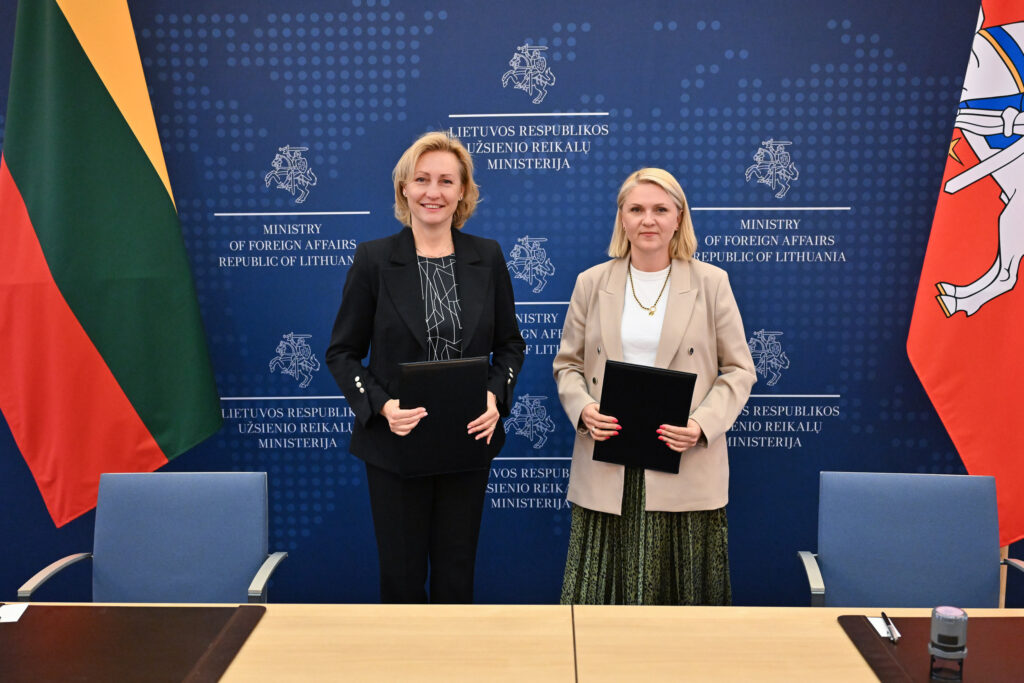
Under the agreement, the university will involve representatives from the Ministry and the Lithuanian diaspora in academic life by inviting them to deliver lectures, participate in discussions and scientific conferences, contribute to the development of new study programmes, and offer KSU students internship opportunities at the MFA and in Lithuanian diplomatic missions abroad. The agreement also encourages academic research related to Lithuania’s foreign and diaspora policy.
KSU plans to promote student volunteering at Ministry events and to support students in preparing final theses on topics relevant to Lithuania’s foreign and diaspora policy. There will also be efforts to engage members of the Lithuanian diaspora in academic and research activities in Lithuania.
“This agreement opens up significant opportunities for our students, lecturers, and researchers to contribute to enhancing Lithuania’s global presence. We are ready to serve as a reliable partner in knowledge, offering our intellectual potential. We are pleased that MFA and diaspora professionals will support the development of our students by mentoring their academic work and providing professional internship opportunities,” said KSU Dr Gitana Neverienė.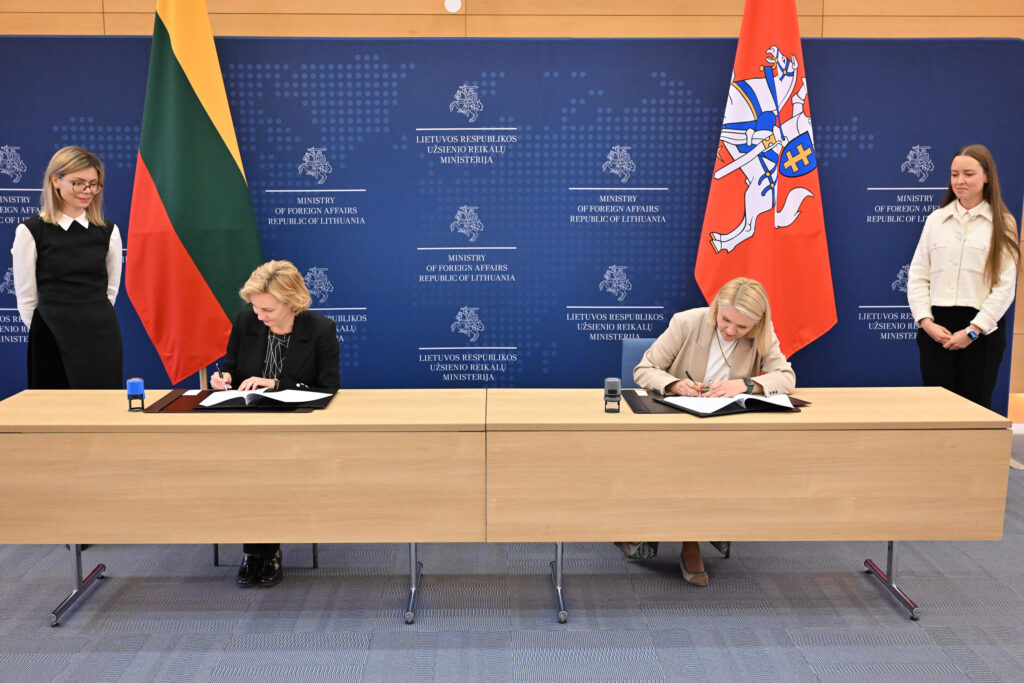
The MFA plans to propose master’s thesis topics for KSU students, encourage its staff—where possible—to collaborate with students and researchers, and provide information relevant to ongoing academic projects. The Ministry also intends to invite university researchers to take part in competitive research calls and provide expert consultations. Through diplomatic channels, efforts will be made to inform young Lithuanians abroad about study opportunities in Lithuania and involve them in joint initiatives with the country’s academic community. 
According to MFA Chancellor Aistė Stakėnienė, engagement with the academic community plays a crucial role in advancing Lithuania’s foreign policy priorities. “By establishing this new partnership, we are uniting diplomatic experience with academic potential, laying a strong foundation for innovative projects, and contributing to the education of the next generation,” she said.
The agreement, valid for a three-year period, marks an important step towards building a sustainable partnership between academia and public institutions.
Photos taken by Jurijus Azanovas (Ministry of Foreign Affairs).
Kazimieras Simonavičius University (KSU) and Locatory.com have signed a cooperation agreement aimed at fostering joint initiatives in the field of aviation management. The partnership will encompass a variety of activities, including the training of aviation professionals, ongoing professional development, scientific research, educational seminars, conferences, and other related events. 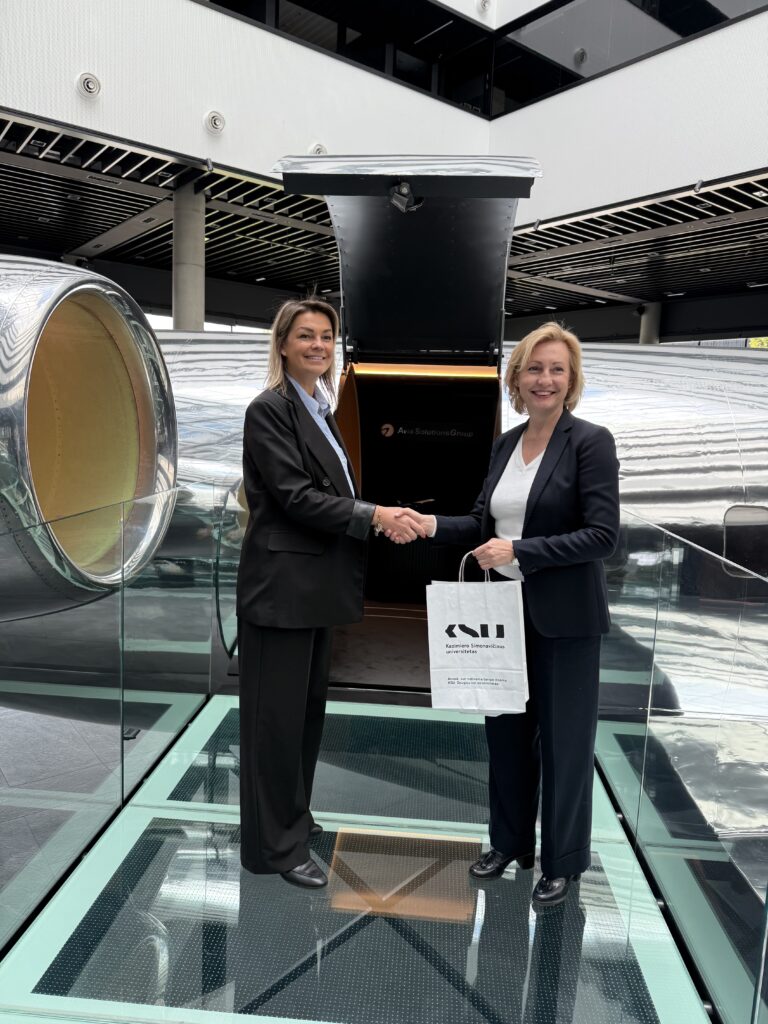
The two organisations will collaborate to enhance Aviation Management study programmes, deliver specialised training for aviation professionals, and strengthen practical training components. They also plan to jointly organise expert activities and exchange best practices.
KSU and Locatory.com have agreed to facilitate student internships and employment opportunities, provide consultancy services, and conduct research to advance aviation services and enhance the knowledge and expertise of professionals in the sector, both nationally and internationally.
About Locatory.com
Locatory.com is a one of the top 3 leading global aviation marketplaces, providing access to 50M+ aircraft parts, 20K+ industry members, and 150+ warehouses worldwide, with a 95% search success rate. Founded in 2010, it helps airlines, MROs, and suppliers find, buy, and sell aircraft parts, MRO capabilities, chemicals, and equipment through an intuitive platform with advanced tools and API integration.
On May 17, Kazimieras Simonavičius University (KSU), in collaboration with Lazy Hack and the Entrepreneurship Academy, will host Students Hack Vilnius 5.0 — a hackathon focused on developing innovative solutions to support sustainable and green economic growth.
This year’s event invites student teams to tackle real-world challenges in four key areas:
The hackathon is open to students from all Lithuanian universities, and the working language will be English.
Building a Culture of Innovation and Impact
According to Deimantė Žilinskienė, KSU Vice-Rector for International Relations and Development and one of the event’s initiators and jury members, the hackathon aligns with KSU’s broader mission to integrate academic learning with real-world application. 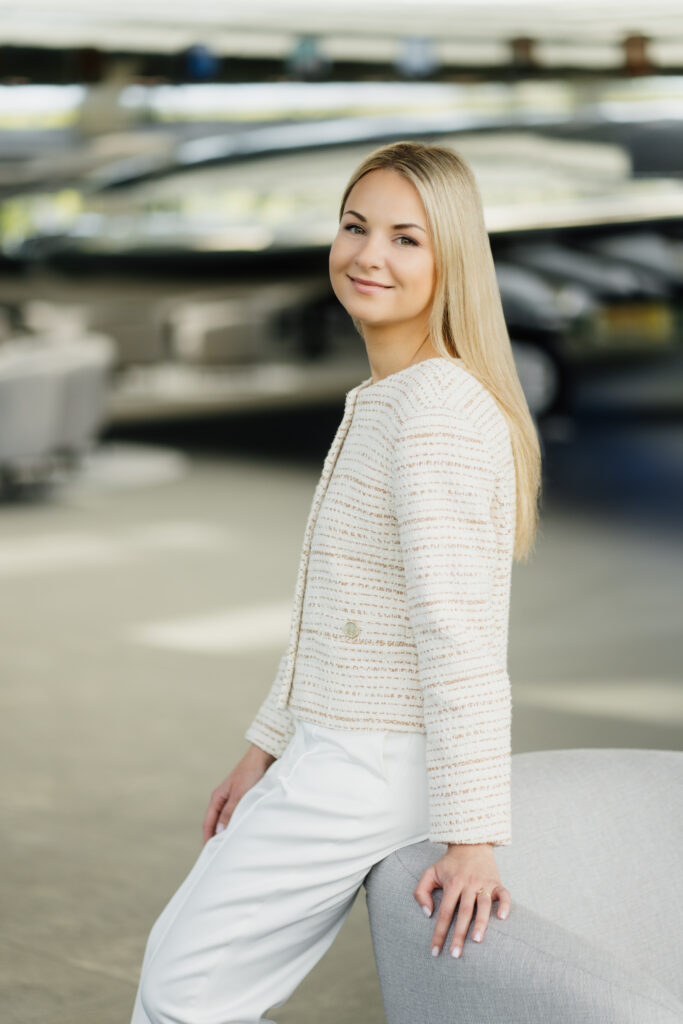
“At KSU, we regularly incorporate practical challenges into our study programmes. Hackathons like this one not only boost student engagement and performance but also create space for experimentation and innovation,” she says.
KSU students, particularly those in the Fashion Industry and Aviation Management programmes, are expected to actively contribute, leveraging their subject knowledge to develop creative and meaningful solutions.
Žilinskienė also emphasizes the importance of the Smart and Sustainable Cities track, especially in light of Vilnius’s aspirations to earn the title of European Green Capital 2025.
Teamwork, Mentorship, and Real-World Outcomes
During the hackathon, participants will work in multidisciplinary teams, each supported by an experienced mentor who will help guide their project from concept to presentation. The strongest solutions will be evaluated by a professional jury, and winning teams will receive prizes.
“A strong idea never goes unnoticed. Many previous hackathon solutions have evolved into startups or further entrepreneurial initiatives,” Žilinskienė notes.
Successful projects were born at Hack4Vilnius, such as:
“It’s inspiring to see how hackathon ideas are implemented in real life. Events like this foster a culture where failure isn’t feared, and experimentation is encouraged. That’s the foundation of any innovation ecosystem,” she adds.
About the Partners
Students Hack Vilnius 5.0 is more than a competition — it’s a launchpad for student creativity, mentorship, and sustainable change. With real-world relevance and interdisciplinary collaboration, the event is set to generate ideas with lasting impact.
KSU University has a new President of the Student Union. She was elected during a meeting of the University Conference members. Eglė Jasiulionytė was chosen for the role. We invite you to read this quick interview and get to know Eglė a little better. 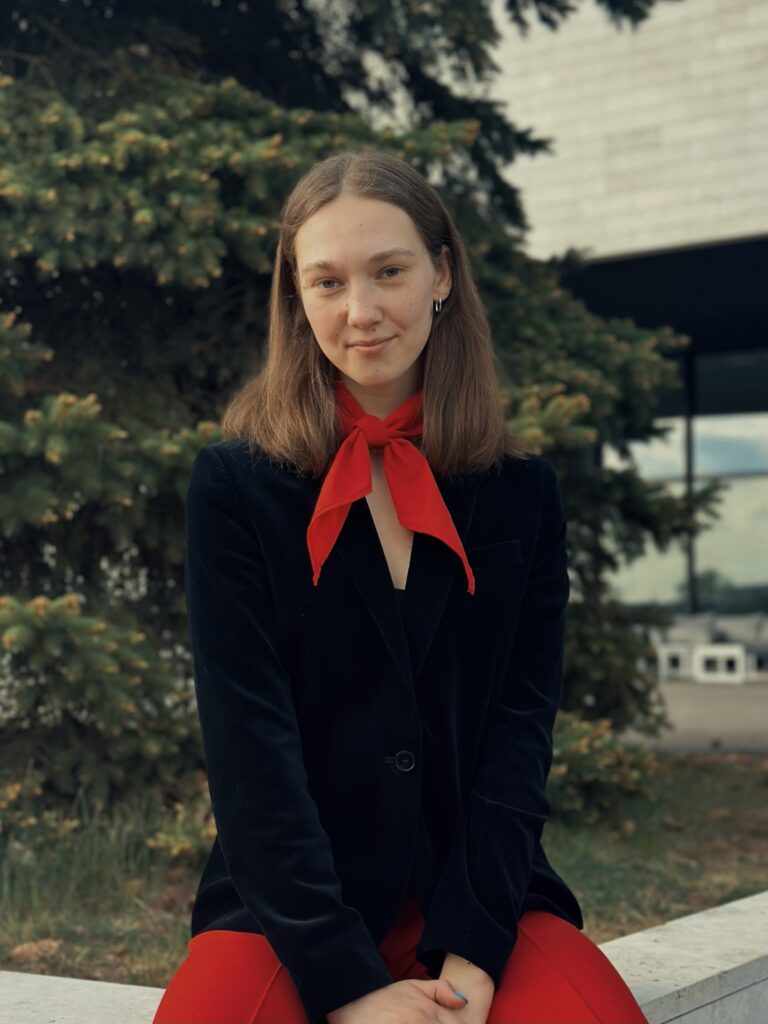
1. How old are you and what do you study?
I’m 19 years old, and I’m a first-year student in the Fashion Industry programme at KSU.
2. Where are you from?
I was born and raised in Vilnius. I still live here now.
3. What inspired you to get involved in community activities?
The desire to contribute to change and help others.
4. Name one thing you would like to change in the world.
People’s mindset – the idea that it’s impossible to have everything.
5. What’s the bravest or strangest thing you’ve ever done?
I came into this world!
6. What’s your best quality?
Openness.
7. What inspires you?
Nature and music.
8. What do you do in your free time?
I draw.
9. What is your first task as President of the Student Union?
To bring the team together and create a good atmosphere within the group.
10. Complete the sentence: “What I dislike the most is…”
What I dislike the most is when people are not genuine – they say one thing and behave in a completely different way.